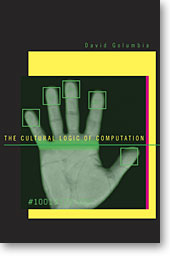The Cultural Logic of Computation |

|
 Zusammenfassungen
Zusammenfassungen
 Advocates of computers make sweeping claims for their inherently transformative power: new and different from previous technologies, they are sure to resolve many of our existing social problems, and perhaps even to cause a positive political revolution.
Advocates of computers make sweeping claims for their inherently transformative power: new and different from previous technologies, they are sure to resolve many of our existing social problems, and perhaps even to cause a positive political revolution.
In The Cultural Logic of Computation, David Golumbia, who worked as a software designer for more than ten years, confronts this orthodoxy, arguing instead that computers are cultural “all the way down”—that there is no part of the apparent technological transformation that is not shaped by historical and cultural processes, or that escapes existing cultural politics. From the perspective of transnational corporations and governments, computers benefit existing power much more fully than they provide means to distribute or contest it. Despite this, our thinking about computers has developed into a nearly invisible ideology Golumbia dubs “computationalism”—an ideology that informs our thinking not just about computers, but about economic and social trends as sweeping as globalization.
Driven by a programmer’s knowledge of computers as well as by a deep engagement with contemporary literary and cultural studies and poststructuralist theory, The Cultural Logic of Computation provides a needed corrective to the uncritical enthusiasm for computers common today in many parts of our culture.
 Kapitel
Kapitel 
- 1. The Cultural Functions of Computation
- 2. Chomsky’s Computationalism
- 3. Genealogies of Philosophical Functionalism
- 4. Linguistic Computationalism
- 5. Computational Semantics, Digital Textuality
- 6. Computation, Globalization, and Cultural Striation
- 7. Computationalism, Striation, and Cultural Authority
- 8. Computationalism and Political Individualism
- 9. Computationalism and Political Authority
- 10. Computers Without Computationalism
 Dieses Buch erwähnt ...
Dieses Buch erwähnt ...
 Begriffe KB IB clear |  Computer Computer computer
, computer
,  Gesellschaft Gesellschaft society
, society
,  Globalisierung Globalisierung globalization
, globalization
,  Technologie Technologie technology technology
|
 Zitationsgraph
Zitationsgraph
 Zitationsgraph (Beta-Test mit vis.js)
Zitationsgraph (Beta-Test mit vis.js)
 Zeitleiste
Zeitleiste
 12 Erwähnungen
12 Erwähnungen 
- The Politics of Education and Technology - Conflicts, Controversies, and Connections (2013)

- Distrusting Educational Technology - Critical Questions for Changing Times (Neil Selwyn) (2013)

- The War on Learning (Elizabeth Losh) (2014)

- The Politics of Bitcoin - Software as Right-Wing Extremism (David Golumbia) (2016)

- Coding Literacy - How Computer Programming Is Changing Writing (Annette Vee) (2017)

- If...Then - Algorithmic Power and Politics (Taina Bucher) (2018)

- Critical Code Studies (Mark C. Marino) (2020)

- Engines of Order - A Mechanology of Algorithmic Techniques (Bernhard Rieder) (2020)


- Doing Research - Wissenschaftspraktiken zwischen Positionierung und Suchanfrage (Sandra Hofhues, Konstanze Schütze) (2022)


- .exe - Software und ihre Bedeutung für eine erziehungswissenschaftliche Medienforschung (Dan Verständig)

- .exe - Software und ihre Bedeutung für eine erziehungswissenschaftliche Medienforschung (Dan Verständig)
- Bildung und Digitalität - Analysen – Diskurse – Perspektiven (Sandra Aßmann, Norbert Ricken) (2023)


 Co-zitierte Bücher
Co-zitierte Bücher



Living and Learning with New Media
Summary of Findings from the Digital Youth Project
(Mizuko Ito, Heather Horst, Matteo Bittanti, danah boyd, Becky Herr-Stephenson, Patricia G. Lange, C.J. Pascoe, Laura Robinson) (2008)



Hanging Out, Messing Around, and Geeking Out
kids living and learning with new media
(Mizuko Ito, Sonja Baumer, Matteo Bittanti, danah boyd, Rachel Cody, Becky Herr-Stephenson, Heather Horst, Patricia G. Lange, Dilan Mahendran, Katynka Z. Martínez, C.J. Pascoe, Dan Perkel, Laura Robinson, Christo Sims, Lisa Tripp) (2010)



(Chris Anderson) (2006)

How the Technology Behind Bitcoin Is Changing Money, Business, and the World
(Don Tapscott, Alex Tapscott) (2016)
 Bibliographisches
Bibliographisches 
 Beat und dieses Buch
Beat und dieses Buch
Beat hat dieses Buch während seiner Zeit am Institut für Medien und Schule (IMS) ins Biblionetz aufgenommen. Beat besitzt weder ein physisches noch ein digitales Exemplar. Aufgrund der wenigen Einträge im Biblionetz scheint er es nicht wirklich gelesen zu haben.





































 Biblionetz-History
Biblionetz-History